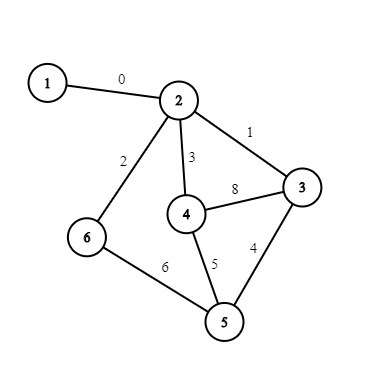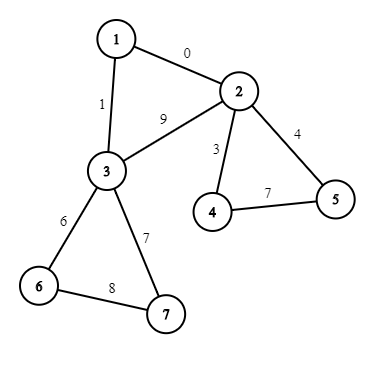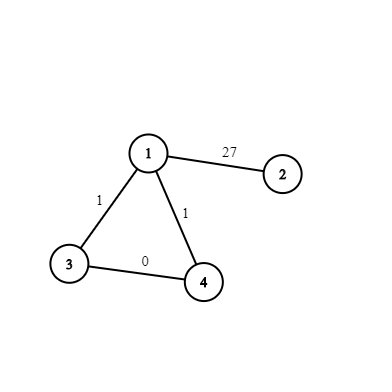CF1299D.Around the World
普及/提高-
通过率:0%
AC君温馨提醒
该题目为【codeforces】题库的题目,您提交的代码将被提交至codeforces进行远程评测,并由ACGO抓取测评结果后进行展示。由于远程测评的测评机由其他平台提供,我们无法保证该服务的稳定性,若提交后无反应,请等待一段时间后再进行重试。
题目描述
Guy-Manuel and Thomas are planning 144 trips around the world.
You are given a simple weighted undirected connected graph with n vertexes and m edges with the following restriction: there isn't any simple cycle (i. e. a cycle which doesn't pass through any vertex more than once) of length greater than 3 which passes through the vertex 1 . The cost of a path (not necessarily simple) in this graph is defined as the XOR of weights of all edges in that path with each edge being counted as many times as the path passes through it.
But the trips with cost 0 aren't exciting.
You may choose any subset of edges incident to the vertex 1 and remove them. How many are there such subsets, that, when removed, there is not any nontrivial cycle with the cost equal to 0 which passes through the vertex 1 in the resulting graph? A cycle is called nontrivial if it passes through some edge odd number of times. As the answer can be very big, output it modulo 109+7 .
输入格式
The first line contains two integers n and m ( 1≤n,m≤105 ) — the number of vertexes and edges in the graph. The i -th of the next m lines contains three integers ai , bi and wi ( 1≤ai,bi≤n,ai=bi,0≤wi<32 ) — the endpoints of the i -th edge and its weight. It's guaranteed there aren't any multiple edges, the graph is connected and there isn't any simple cycle of length greater than 3 which passes through the vertex 1 .
输出格式
Output the answer modulo 109+7 .
输入输出样例
输入#1
6 8 1 2 0 2 3 1 2 4 3 2 6 2 3 4 8 3 5 4 5 4 5 5 6 6
输出#1
2
输入#2
7 9 1 2 0 1 3 1 2 3 9 2 4 3 2 5 4 4 5 7 3 6 6 3 7 7 6 7 8
输出#2
1
输入#3
4 4 1 2 27 1 3 1 1 4 1 3 4 0
输出#3
6
说明/提示
The pictures below represent the graphs from examples.  In the first example, there aren't any nontrivial cycles with cost 0 , so we can either remove or keep the only edge incident to the vertex 1 .
In the first example, there aren't any nontrivial cycles with cost 0 , so we can either remove or keep the only edge incident to the vertex 1 .  In the second example, if we don't remove the edge 1−2 , then there is a cycle 1−2−4−5−2−1 with cost 0 ; also if we don't remove the edge 1−3 , then there is a cycle 1−3−2−4−5−2−3−1 of cost 0 . The only valid subset consists of both edges.
In the second example, if we don't remove the edge 1−2 , then there is a cycle 1−2−4−5−2−1 with cost 0 ; also if we don't remove the edge 1−3 , then there is a cycle 1−3−2−4−5−2−3−1 of cost 0 . The only valid subset consists of both edges.  In the third example, all subsets are valid except for those two in which both edges 1−3 and 1−4 are kept.
In the third example, all subsets are valid except for those two in which both edges 1−3 and 1−4 are kept.